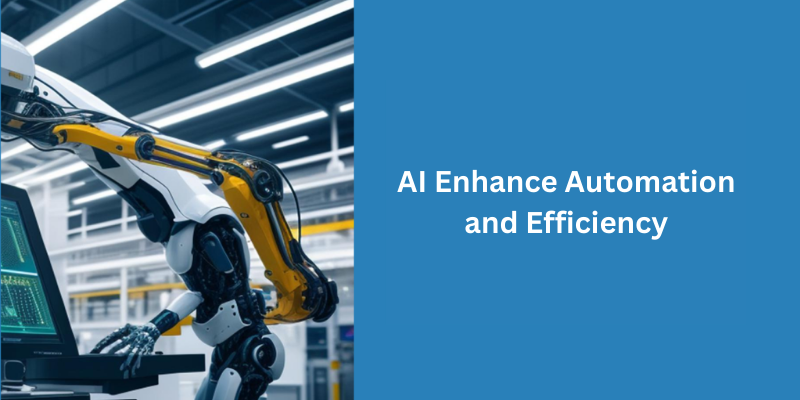
Artificial Intelligence (AI) is revolutionizing automation and efficiency across various industries by integrating advanced algorithms and machine learning techniques. AI-driven systems streamline repetitive tasks, enhance data analysis, and optimize resource management. This leads to faster decision-making, reduced errors, and increased operational productivity. As AI technologies evolve, their impact on enhancing automation and efficiency continues to grow, transforming traditional business practices. This blog explores how AI to enhance automation and efficiency. Enrol in the Artificial Intelligence Course in Gurgaon, which provides in-depth training for mastering Machine Learning algorithms.
Upgrading Automation with AI
Artificial Intelligence (AI) significantly transforms automation by enabling machines to perform tasks that previously required human intervention. AI-driven automation uses advanced algorithms to execute repetitive and complex processes with minimal human input. This leads to improved accuracy and speed in operations. For instance, in manufacturing, AI systems can automate assembly lines, adjust machine settings in real-time based on production data, and even predict maintenance needs before issues arise. This proactive approach reduces downtime and increases overall productivity.
Improving Efficiency through AI Algorithms
AI algorithms enhance efficiency by optimizing workflows and decision-making processes. Machine learning models analyze large volumes of data to identify patterns and trends that human analysts might miss. This capability allows businesses to make data-driven decisions swiftly and accurately. In sectors like finance, AI algorithms can process and analyze market data at speeds unattainable by humans, enabling rapid investment decisions and risk management. Similarly, in logistics, AI helps optimize routes and delivery schedules, reducing fuel consumption and operational costs. Join the Artificial Intelligence Course in Kolkata to explore AI concepts and gather more in-depth information.
Streamlining Operations with AI-Driven Systems
AI-driven systems streamline operations by automating administrative and routine tasks. In customer service, AI chatbots handle inquiries, process orders, and provide support around the clock. These systems use natural language processing (NLP) to understand and respond to customer queries, freeing up human agents to focus on more complex issues. In healthcare, AI systems assist with scheduling, patient record management, and even diagnostic processes, leading to faster service and more efficient use of resources.
Enhancing Data Analysis and Insights
AI enhances data analysis and insights by leveraging its ability to process and interpret vast amounts of information quickly. Traditional data analysis methods often struggle with large datasets or complex variables, but AI algorithms excel in these environments. For example, AI can analyze customer behavior data to provide personalized recommendations and targeted marketing strategies. In research and development, AI accelerates the analysis of experimental data, helping scientists and engineers make discoveries faster and with greater precision.
Reducing Human Error and Increasing Precision
AI reduces human error and increases precision by taking over tasks that are prone to manual mistakes. In industries such as aerospace and automotive manufacturing, precision is critical. AI systems control machinery with high accuracy, reducing the likelihood of defects and improving product quality. In healthcare, AI algorithms analyze medical images with high accuracy, assisting radiologists in detecting abnormalities that might be missed in manual reviews. This precision not only improves outcomes but also enhances overall safety. Explore Artificial Intelligence Course in Ahmedabad assists in mastering AI techniques.
Enabling Scalable Solutions
AI enables scalable solutions by adapting to increasing workloads without compromising performance. Unlike traditional systems that may require significant reconfiguration or additional resources to handle growth, AI systems can scale efficiently. For instance, cloud-based AI platforms can handle vast amounts of data and user requests simultaneously, making them ideal for applications with fluctuating demand. This scalability ensures that businesses can grow and adapt to changing market conditions without significant disruptions.
Optimizing Resource Management
AI optimizes resource management by predicting needs and adjusting resources accordingly. In agriculture, AI systems monitor crop health and environmental conditions to optimize irrigation, fertilization, and pest control. This precise approach minimizes waste and boosts yields. In energy management, AI predicts energy consumption patterns and adjusts supply accordingly, leading to more efficient use of resources and cost savings. This proactive management helps organizations minimize resource wastage and maximize efficiency.
Enabling Advanced Manufacturing Techniques
AI facilitates advanced manufacturing techniques by integrating with cutting-edge technologies such as robotics and 3D printing. In smart factories, AI-powered robots work alongside human operators, performing tasks with precision and speed. These robots can adapt to changes in production requirements and work continuously without fatigue. Additionally, AI optimizes 3D printing processes by adjusting parameters in real-time, improving the quality and consistency of manufactured parts. This integration enhances flexibility and innovation in manufacturing. You can enrol in the Artificial Intelligence Course in Delhi, which will aid you in understanding and learning more about machine learning models.
Enhancing Predictive Maintenance
AI enhances predictive maintenance by analyzing data from equipment sensors to forecast potential failures before they occur. This approach allows for timely maintenance interventions, reducing unexpected breakdowns and extending the lifespan of machinery. For example, in the transportation industry, AI systems analyze vehicle performance data to predict when maintenance is needed, preventing costly repairs and ensuring operational continuity. This proactive maintenance strategy minimizes downtime and optimizes overall equipment effectiveness.
Driving Innovation through AI Technologies
AI drives innovation by enabling the development of new technologies and solutions. AI research continuously pushes the boundaries of what is possible, leading to advancements in various fields. In finance, AI-powered algorithms create new investment strategies and risk management tools. In healthcare, AI facilitates the development of personalized treatment plans and advanced diagnostic tools. This continuous innovation not only improves existing systems but also opens up new opportunities for growth and development.
By integrating AI into automation processes, businesses can achieve higher efficiency, reduced costs, and improved operational capabilities. The transformative impact of AI on automation is evident across multiple sectors, driving progress and enabling new possibilities. Joining the Artificial Intelligence Course in Jaipur could be a crucial step toward achieving a successful career.
Also Check: Artificial Intelligence Interview Questions and Answers
